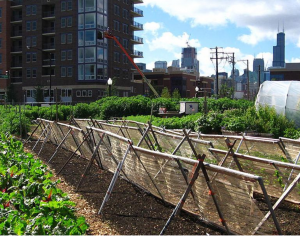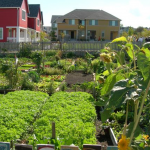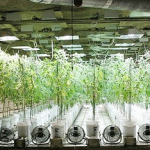Are local regulations hurting future food supplies?
If local vegetable farms are to grow,
they need fewer constraints from government.
 Scientists project warming will make extreme weather events more likely to threaten our crops. And food costs already take a growing percentage of our income. We should look for ways to climate-proof the security and cost of our food supply. Urban agricultural projects are a growing part of a more climate-proof food economy, but in many places they need friendlier municipal regulations.
Scientists project warming will make extreme weather events more likely to threaten our crops. And food costs already take a growing percentage of our income. We should look for ways to climate-proof the security and cost of our food supply. Urban agricultural projects are a growing part of a more climate-proof food economy, but in many places they need friendlier municipal regulations.
Chicago representative Sonya Harper is proposing urban agricultural zones which would utilize vacant town lots to grow crops and even raise and process livestock. Organizations or individuals who develop these zones would receive subsidies and tax breaks to cultivate and sell locally grown foods. In addition to helping expand food production in less climate-threatened regions, Harper’s bill would stimulate local economies and increase access to healthy foods. The bill is waiting to be called to the Illinois House floor.
Even if there are incentives; where do the skills come from? Brooklyn, NY announced $1 million in funding for an urban agriculture incubator in Brooklyn. Incubators provide beginning farmers a plot of land, access to farm infrastructure, and extensive training in food production and the business of farming.
If you are to help climate-proof your food supply, you need to support local growing initiatives. Keep an eye out for news ideas in your town; attend meetings on the topic; phone or visit City Hall to show your support for local food production projects. Raising local production of healthy, affordable food can pay off as increasing droughts and storms increasingly affect our traditional sources.



